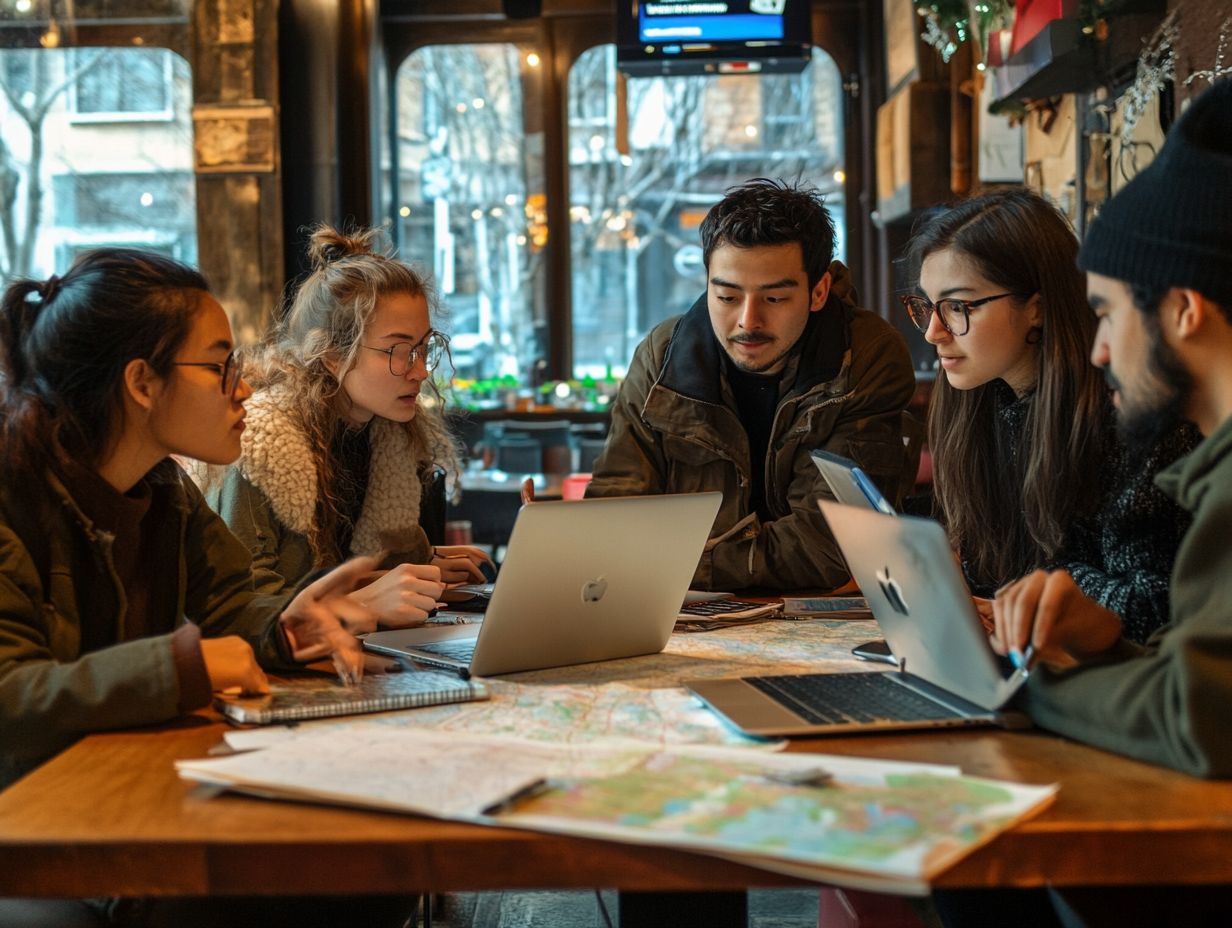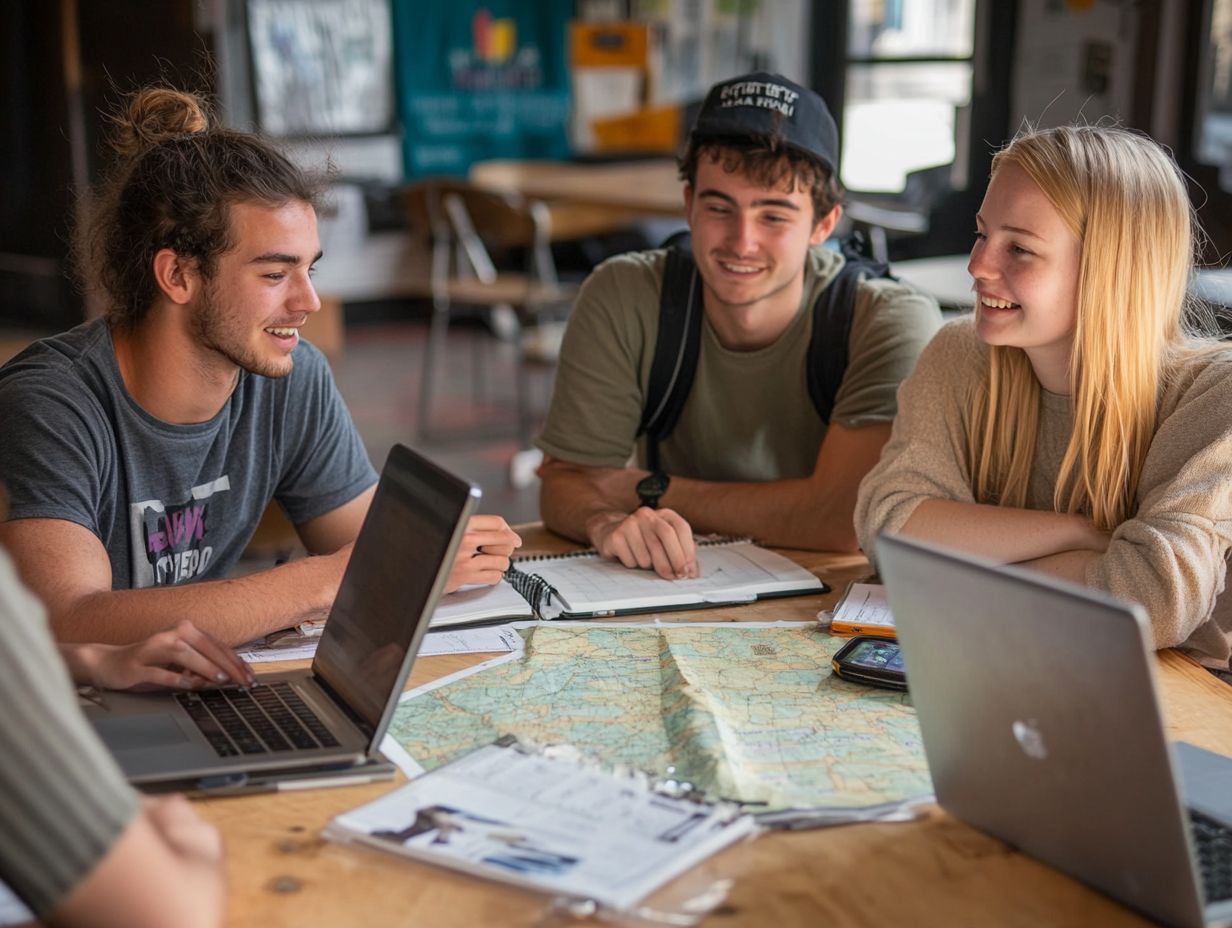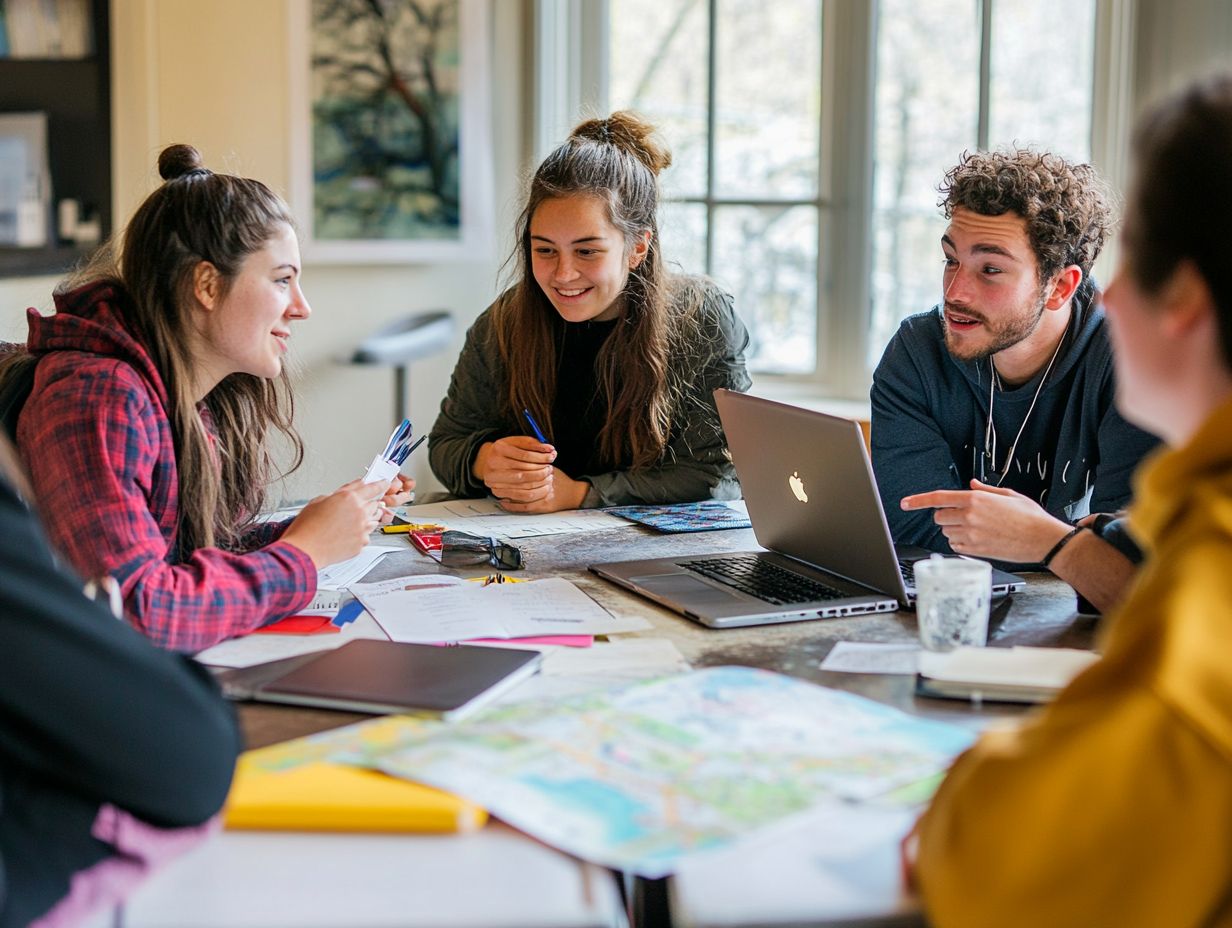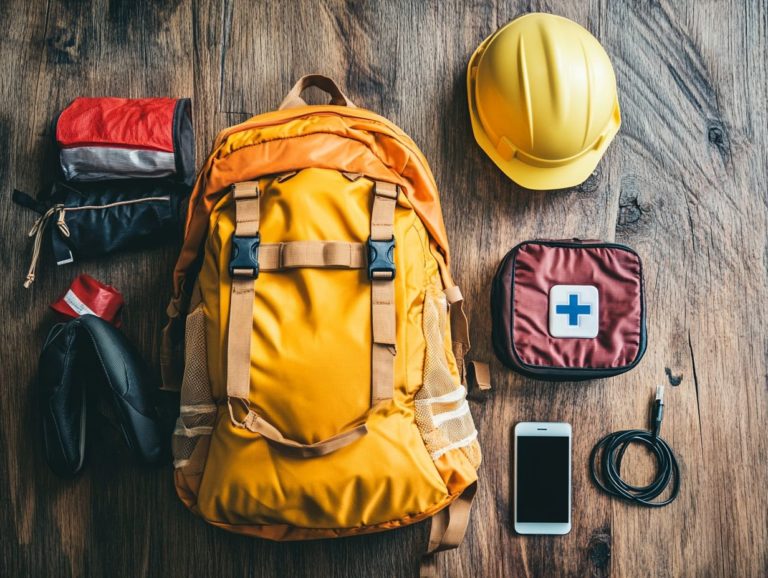How to Plan a Group Trip as Students
Planning a group trip as students can be an exhilarating adventure, brimming with chances for bonding, exploration, and unforgettable memories. This guide lays out the essential steps to ensure your trip is a resounding success, from selecting the ideal destination to crafting a budget that won t strain your finances. It also offers practical tips on transportation, accommodations, and navigating conflicts within the group.
Whether you’re aiming to deepen friendships or maximize your college experience, this guide has everything you need to thrive!
Contents
- Key Takeaways:
- Benefits of Planning a Group Trip as Students
- Choosing a Destination
- Setting a Budget
- Planning Transportation and Accommodations
- Creating an Itinerary
- Assigning Responsibilities
- Dealing with Conflicts
- Frequently Asked Questions
- 1. What are the benefits of planning a group trip as students?
- 2. How do I choose a destination for our group trip?
- 3. How can we keep track of expenses and budget for our trip?
- 4. Is it necessary to plan out an itinerary for our group trip?
- 5. How can we ensure everyone’s safety during the trip?
- 6. How can we handle conflicts or disagreements while planning the trip?
Key Takeaways:

- Planning a group trip as students can strengthen friendships and be cost-effective.
- When choosing a destination, consider budget-friendly options and places popular among students.
- Set a budget and stick to it by planning in advance and researching discounts and deals.
Benefits of Planning a Group Trip as Students
Planning a group trip offers huge benefits. You’ll create amazing memories while deepening friendships and saving money.
These adventures help you develop teamwork, budgeting, and organizational skills while diving into new learning opportunities.
Whether visiting the Liberty Bell or exploring Greece, you’ll enrich your education and enjoy personal growth.
Traveling as a group often unlocks better rates on accommodations and transportation, making it a savvy, cost-effective choice.
Building Friendships and Saving Money
Building friendships and saving money are two significant advantages of group travel, especially for students eager to deepen friendships while managing expenses effectively.
When you embark on adventures with your peers, you naturally develop teamwork skills as you navigate logistics, plan itineraries, and share responsibilities. This collaborative spirit fosters camaraderie and creates shared experiences that can strengthen friendships for years to come.
Exploring group discounts on accommodations and activities can substantially reduce overall travel costs, making it easier for everyone to participate without financial strain. By splitting costs for transportation and meals and collaboratively crafting a well-thought-out budget, you can maximize your resources while enjoying unforgettable excursions.
Choosing a Destination
Selecting a destination for group travel is an essential step in the planning process, especially for trips that help you learn. These educational experiences significantly enhance student engagement and learning opportunities.
Factors to Consider and Popular Student-Friendly Locations
When selecting a destination, consider key factors like travel requirements, budget planning, and the availability of group activities that align with students’ interests. Assessing the educational value of potential locations is crucial, as enriching learning experiences can significantly enhance your trip.
For instance, historic Jamestown offers profound lessons in American history, serving as an engaging educational stop. If you re after excitement, venues like the Hard Rock Cafe present a vibrant atmosphere perfect for group bonding and enjoyment.
By evaluating both educational and recreational opportunities, you can strike a balance that caters to diverse interests and budgetary constraints, ensuring a memorable journey for everyone involved.
Setting a Budget

Setting a budget is essential when planning a group trip; it enables you to establish financial boundaries and discover options that align with your means while enhancing your travel experience to the fullest.
Tips for Budgeting and Saving Money
Effective budgeting and saving strategies are vital for students planning a group trip, as they allow everyone to relish the experience without the burden of financial strain. Additionally, those interested in exploring on their own can benefit from tips for traveling solo as a student.
To enhance your funds while traveling, consider leveraging various travel apps that offer exclusive deals. By comparing prices and seeking out group discounts, you can significantly reduce trip expenses.
Tools like Splitwise are invaluable for managing shared costs. They provide a hassle-free way to track everyone’s contributions.
Establishing a daily spending cap can also foster financial discipline throughout your journey. Planning meals and exploring free local attractions will help you stretch your budget even further.
By steering clear of peak travel seasons, you can ensure a memorable adventure without the worry of overspending.
Planning Transportation and Accommodations
Planning transportation and accommodations is an important aspect of organizing a successful group trip. It can make your trip much more enjoyable!
By giving careful consideration to these elements, you ensure that all participants enjoy a seamless journey and a comfortable stay.
Travel and Lodging Options
In terms of travel and lodging, you have a range of options to explore. This ensures you find the perfect fit for your group s needs and budget.
- Hostels: Shared accommodations that are often more affordable than hotels.
- Budget hotels: Cost-effective lodging options.
- Vacation rentals: Provide amenities like kitchens and communal living spaces.
- Group-friendly lodges: Accommodations designed for larger parties.
Group bookings often come with enticing discounts, making it easier on the wallet for students traveling together. Vacation rentals create a cozy, home-like atmosphere, while staying in a hostel fosters social interactions.
Some hotels even offer complimentary breakfast or shuttle services for larger groups. This enhances both convenience and comfort while you explore new destinations.
By carefully evaluating these options, you can maximize your travel experience without stretching your budget too thin.
Creating an Itinerary
Crafting an itinerary is essential for a well-organized trip. It ensures that every group member is informed about planned activities and must-see attractions.
By taking the time to outline your journey, you enhance the overall experience and foster a sense of shared excitement and anticipation among your companions.
Must-See Attractions and Activities

Identifying must-see attractions and activities allows you to maximize your experience during educational excursions. This blends both enjoyment and learning seamlessly.
Your student group can delve into historical landmarks like the Liberty Bell, which offers a fascinating glimpse into America’s past and the significance of freedom.
Engaging venues such as the Philadelphia Museum of Art ignite creativity and encourage discussions about history and culture.
For a touch of light-hearted fun, a visit to Dave & Buster’s creates an exhilarating atmosphere. You and your peers can bond over games and delicious food.
By thoughtfully integrating these experiences, you cultivate a well-rounded itinerary that harmonizes education with entertainment. This ensures your journey is both enriching and unforgettable.
Assigning Responsibilities
Assigning responsibilities among group members is crucial for ensuring a seamless trip preparation. This approach fosters a sense of involvement and keeps everyone engaged in the journey ahead.
Delegating Tasks Among Group Members
Delegating tasks among group members is a smart way to streamline your planning process and ensure that everyone contributes effectively to the trip preparation.
By assigning specific roles like having one person manage travel arrangements while another coordinates activities you’ll find that the workload becomes much more manageable. Group tools, like shared calendars and task management apps, enhance organization.
This approach allows each member to track deadlines and responsibilities in real-time, helping everyone take responsibility.
Encouraging open communication within the group improves your decision-making process. For instance, setting a weekly update meeting helps keep everyone aligned, ensuring that all members are on the same page and ready to share their insights and preferences.
Dealing with Conflicts
Navigating conflicts is an unavoidable aspect of group travel; however, with the right approach, you can transform these challenges into opportunities that enhance group dynamics and elevate the overall experience.
Tips for Resolving Issues and Maintaining Harmony
Implementing effective strategies for resolving issues and maintaining harmony is crucial for a successful group travel experience, allowing everyone to truly savor their time together.
One key approach you can adopt is active listening where you genuinely engage with what others are saying. This fosters a deeper understanding and helps uncover underlying issues that may not be immediately apparent.
Embracing compromise can turn potential conflicts into collaborative problem-solving opportunities. By establishing open lines of communication, you and your fellow travelers can express preferences or concerns without the fear of judgment, ensuring that everyone feels valued.
These techniques not only alleviate tension but also enhance the overall dynamics, resulting in a more enjoyable and cohesive journey for everyone involved.
Frequently Asked Questions

1. What are the benefits of planning a group trip as students?
Planning a trip as a group isn’t just smart; it s a chance to create unforgettable memories together! You can save money by splitting costs for transportation, accommodation, and activities. It also allows for a more social and dynamic experience, as you can share memories and bond with your fellow students.
2. How do I choose a destination for our group trip?
First, consider everyone’s interests and budget. It’s important to find a destination that everyone will enjoy and can afford. Also, think about the time of year and the availability of transportation and accommodation.
3. How can we keep track of expenses and budget for our trip?
Use a budgeting app or create a spreadsheet to keep track of expenses and divide the costs evenly among the group. You can also set a budget limit and stick to it to avoid overspending.
4. Is it necessary to plan out an itinerary for our group trip?
While some spontaneity can be fun, it’s recommended to have a general itinerary to avoid wasting time and missing out on important activities. Plan out the main attractions and leave some free time for unplanned activities.
5. How can we ensure everyone’s safety during the trip?
Assign a designated contact person responsible for keeping track of everyone and have a communication plan in case of emergencies. Additionally, research the safety of your chosen destination and take necessary precautions.
6. How can we handle conflicts or disagreements while planning the trip?
Communication is key! Encourage open and honest dialogue among group members and strive to find compromises. It’s important to listen to each other’s ideas and concerns to develop a plan that works for everyone.
Ready to plan your next adventure? Gather your friends and start making memories today!




![5 Essential Travel Tips When Visiting [Local Area]](https://abroadfocus.com/wp-content/uploads/2024/09/5-essential-travel-tips-when-visiting-local-area-o5-768x578.jpeg)